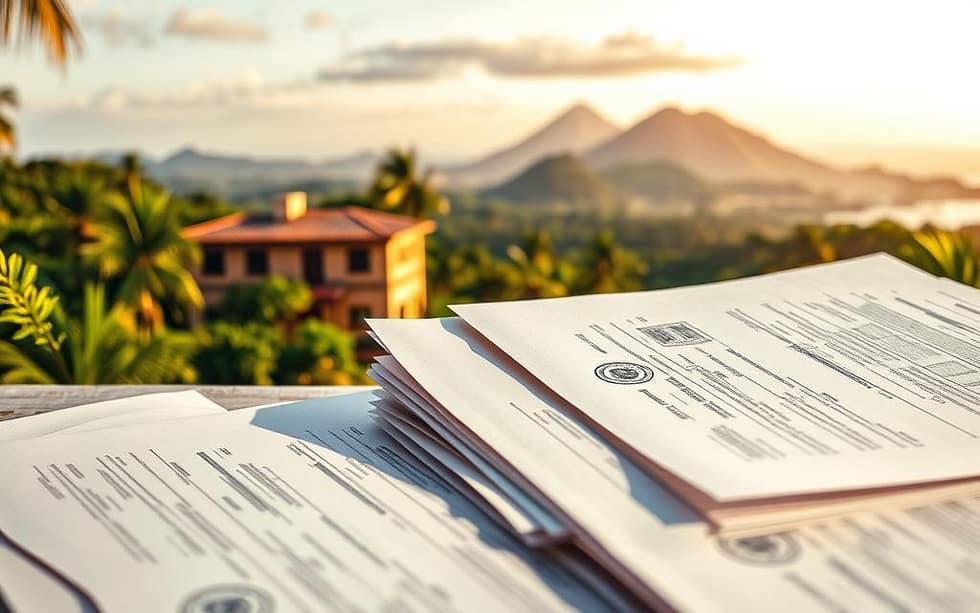
Securing Loans in Costa Rica: What You Need to Know
At GAP Investments, we understand the unique needs of foreign investors looking to secure financing in Costa Rica. Our tailored financing solutions prioritize safety and risk management, providing a secure investment environment. Costa Rica’s financial system is a dynamic blend of traditional banks and innovative fintech solutions, creating a unique lending landscape.
Whether you’re seeking a mortgage, equity loan, or business financing, understanding the system is crucial. We offer competitive interest rates and flexible terms designed specifically for expats and investors. By exploring the comprehensive landscape of securing loans in Costa Rica, you’ll be better equipped to navigate the challenges and make informed decisions about your investment.
The Costa Rican Financial Landscape
The Costa Rican lending market is characterized by a blend of state-owned institutions and private banks, each with its own set of advantages and limitations. This dual banking system offers a range of loan options for both locals and foreign investors.
Banking System Overview
Costa Rica’s banking system is divided between state-owned banks, such as Banco Nacional and Banco de Costa Rica, and private banks. State-owned banks typically offer lower interest rates, ranging from 7-12%, but have stricter requirements and longer processing times. In contrast, private banks provide more flexible terms and faster approval processes, although at higher interest rates of 12-18%.
- State-owned banks offer stability and lower interest rates.
- Private banks provide flexibility and faster loan processing.
- The choice between state-owned and private banks depends on the borrower’s financial situation and needs.
Unique Challenges for Foreign Investors
Foreign investors face distinct challenges in Costa Rica’s financial landscape, including the lack of local credit history and higher documentation requirements. Building a strong credit score in Costa Rica can be challenging but is rewarding, as it opens doors to better financing options for real estate or business investments.
- Foreign investors must navigate the complexities of Costa Rica’s lending practices.
- Establishing a local credit history is crucial for securing favorable loan terms.
- Fintech solutions are emerging as alternative financing options for foreign investors.
Understanding the intricacies of Costa Rica’s financial landscape is essential for making informed decisions about loan options. As we explore further, we’ll examine how GAP Investments bridges the gap between traditional banking limitations and the needs of foreign investors.
Understanding How to Secure Loans in Costa Rica
When it comes to securing loans in Costa Rica, knowing the differences between government and private banking options is crucial. This understanding can significantly impact your ability to secure financing that meets your needs.
Government vs. Private Banking Options
Government-owned banks, such as Banco Nacional and Banco de Costa Rica, are known for their stability and lower interest rates, typically ranging from 7% to 12%. They often cater to long-term financing needs, like mortgages. However, their approval process can be slower due to stricter documentation requirements.
Private banks, on the other hand, offer more flexibility and faster processing times, making them ideal for foreigners and investors who need quick access to financing. Private lenders like GAP Investments provide tailored financing solutions specifically designed for foreign investors.
GAP Investments: Tailored Financing Solutions
At GAP Investments, we offer loans ranging from $50,000 to over $3,000,000 USD, with competitive interest rates between 12% and 18% annually, based on loan-to-value ratios and other risk factors. Our financing solutions are structured with terms ranging from six months to 3 years, providing flexibility for various investment strategies.
By understanding the documentation requirements for each type of lender, you can better navigate the loan application process. Government banks require extensive paperwork, while private lenders often streamline the process. For more information on securing loans in Costa Rica, visit our detailed guide on understanding how to secure loans in Costa.
Eligibility Requirements for Foreign Borrowers
Foreign investors looking to secure financing in Costa Rica must navigate a unique set of eligibility requirements. Understanding these criteria is crucial for a successful loan application.
Residency Status and Its Impact
Residency status plays a significant role in determining loan eligibility in Costa Rica. Permanent residents typically enjoy more favorable terms, including lower interest rates, often between 7-8%. In contrast, temporary residents and non-residents may face stricter requirements, such as higher down payments or additional documentation. For instance, non-residents might need to provide proof of income, tax returns, and a detailed credit history. Some lenders also require a local co-signer or collateral. At GAP Investments, we offer tailored financing solutions that cater to the needs of foreign borrowers, considering their residency status.
Credit History Considerations
Costa Rican lenders place significant emphasis on credit history when evaluating loan applications. However, they typically cannot access international credit reports, creating a challenge for foreign borrowers. It’s essential for foreign investors to understand that their excellent credit score in their home country doesn’t automatically translate to Costa Rica’s financial system. Non-residents often face stricter collateral requirements, with loan-to-value ratios limited to 50-60% compared to 70-80% for residents. Establishing a local credit history can significantly improve loan eligibility.
Essential Documentation for Loan Applications
Loan applications in Costa Rica necessitate a detailed and organized approach to documentation. This ensures that the process is smooth and that all requirements are met efficiently.
Personal Identification and Financial Proof
Personal identification is the first step in any loan application. Borrowers must provide a valid passport or residency card, which helps lenders confirm their identity and legal status in Costa Rica. Financial proof is equally crucial, with lenders typically asking for bank reference letters, tax returns, and 12 months of bank statements to assess income, expenses, and the ability to repay the loan.
- Valid passport or residency card
- Bank reference letters
- Tax returns
- 12 months of bank statements
For corporate borrowers, additional documents such as financial statements and cash flow projections may be required to evaluate their financial health and loan repayment capability.
Property Documentation Requirements
For secured loans, property documentation is critical. This includes property titles, recent appraisals, and proof that the property is free of liens or encumbrances. Property-specific documentation may also encompass recent property tax receipts and utility bills to verify the property address.
- Property titles
- Recent property appraisals
- Proof of no liens or encumbrances
- Recent property tax receipts
- Utility bills
GAP Investments helps streamline the documentation process for foreign investors by providing clear guidance on the required documents based on their specific situation, thereby improving approval chances and speeding up the processing time.

Types of Loans Available in Costa Rica
For those looking to invest or purchase property in Costa Rica, several loan options are available, each with its unique benefits. Understanding these options is crucial for making informed decisions.
Mortgage and Real Estate Financing
Mortgage and real estate financing in Costa Rica are popular among foreign investors. These loans typically come with terms ranging from 5 to 30 years, and interest rates vary between 7% and 12% for traditional banks and 12% and 18% for private lenders.
Developer financing is also a viable option, where property developers act as lenders, offering flexible terms and payment plans. This can be particularly helpful for buyers who may not qualify for traditional bank loans.
Business and Investment Loans
Business loans in Costa Rica can be challenging for foreigners to obtain, often requiring established business operations in the country and comprehensive business plans. However, investment loans for income-producing properties may have more favorable terms, as lenders consider the property’s income potential.
GAP Investments specializes in providing tailored financing solutions for real estate investments, with loan amounts ranging from $50,000 to over $3,000,000 USD. Understanding the specific requirements and terms for each loan type helps investors select the most appropriate financing option for their investment strategy in Costa Rica.
Equity Loans and Financing Options
In Costa Rica, property owners can tap into their home equity to secure loans for various financial needs. This financing option is particularly beneficial for those looking to leverage their property’s value for renovations, investments, or other financial obligations.
Understanding Home Equity in Costa Rica
Home equity is the difference between your property’s market value and the amount you owe on it. For instance, if your home is worth $200,000 and you owe $100,000, your equity is $100,000. Lenders use this equity to determine how much you can borrow. In Costa Rica, lenders consider home equity a significant factor in securing loans.
- Equity loans allow property owners to leverage their existing real estate for financing.
- Home equity is calculated based on the property’s current market value minus any outstanding mortgages.
Loan-to-Value Ratios and Interest Rates
Loan-to-Value (LTV) ratios are crucial in determining the amount you can borrow against your property’s equity. In Costa Rica, LTV ratios typically range from 50% to 80%. This means you can borrow up to 80% of your property’s value. For example, on a $200,000 home, you might qualify for a loan of $160,000. Interest rates for equity loans vary, with traditional banks offering rates between 8-12% and private lenders offering rates between 12-18%.
- LTV ratios in Costa Rica range from 50% to 80%, with non-residents often limited to the lower end.
- Interest rates vary significantly between traditional banks and private lenders.
Alternative Financing Methods for Non-Residents
Non-resident investors in Costa Rica can explore various alternative financing methods beyond traditional banking. These alternatives can provide more flexible terms and faster processing times, making it easier to secure the necessary funds for your investment.
Developer and Owner Financing
Developer financing is a popular option for non-residents, where property developers act as lenders, offering flexible payment plans. This arrangement can be particularly helpful for buyers who don’t qualify for traditional bank loans. Owner financing is another viable alternative, where the seller provides the loan directly to the buyer, often with more negotiable terms.
These financing methods can offer significant benefits, including lower interest rates and more flexible repayment schedules. For instance, developer financing typically requires a 30-50% down payment and offers terms of 3-10 years.
Self-Directed IRAs and Creative Funding Solutions
Self-Directed IRAs (SDIRAs) are gaining traction among foreign investors, allowing individuals to use their retirement funds to purchase property in Costa Rica. This option provides a tax-advantaged way to invest while diversifying your portfolio. Creative funding solutions, such as leveraging equity from properties in your home country or forming joint ventures, can also be explored.
At GAP Investments, we work with clients to explore and implement these alternative financing methods, providing guidance on which options best suit particular investment strategies and financial situations.
Navigating the Loan Application Process
Navigating the loan application process in Costa Rica can be complex, but understanding the steps involved can simplify the experience. We will guide you through the process, highlighting the key steps and considerations when applying for a loan.
Step-by-Step Application Guide
The loan application process typically begins with a pre-qualification assessment, where lenders evaluate your basic financial information to determine potential loan eligibility and terms. Document preparation is the most critical and time-consuming step, requiring gathering all necessary personal identification, financial records, and property documentation. Formal application submission involves completing the lender’s application forms and submitting all required documentation for review.
- Pre-qualification assessment to determine loan eligibility
- Gathering necessary documentation, including personal identification and financial records
- Formal application submission with required documentation
Managing Fees, Closing Costs, and Processing Times
Understanding the fees associated with loan applications in Costa Rica is crucial. Closing costs typically include legal fees (1-2% of loan amount), mortgage registration fees (approximately 1.64% of the loan amount), and notary fees. The total closing process can take approximately 30-45 days with traditional banks, but private lenders can complete it in as little as 2 weeks. Foreign borrowers should also budget for additional costs, including document translation fees and authentication costs for foreign documents.
- Legal fees: 1-2% of loan amount
- Mortgage registration fees: approximately 1.64% of loan amount
- Processing times vary between traditional banks and private lenders
Conclusion: Making Informed Financing Decisions in Costa Rica
As we navigate the complexities of securing loans in Costa Rica, it’s essential to consider multiple factors that impact your financing decisions. The country’s stable financial system provides a secure environment for investments, but it also means that lenders have conservative practices.
Understanding the trade-offs between traditional banks and private lenders is crucial. Banks offer lower interest rates but have slower processing times and stricter requirements. In contrast, private lenders like GAP Investments provide faster approval but at higher interest rates. For instance, GAP Investments offers loans ranging from $50,000 to over $3,000,000 USD with competitive interest rates based on loan-to-value ratios.
Foreign investors should carefully consider their investment timeline. Short-term investments might benefit from private lending options, while long-term investments might be more suitable for traditional bank loans. Alternative financing methods, such as developer financing, owner financing, and Self-Directed IRAs, offer creative solutions for those who don’t qualify for traditional loans or prefer more flexible terms.
Proper preparation is key to securing a loan in Costa Rica. Gathering all necessary documentation and understanding eligibility requirements before applying significantly improves the chances of loan approval. Working with experienced professionals who understand both Costa Rican financial regulations and the unique needs of foreign investors can provide invaluable guidance.
For those interested in exploring private lending options, GAP Investments offers terms from six months to three years, with interest rates starting at 12% based on LTV and other risk factors. To discuss your specific financing needs and investment goals in Costa Rica, contact GAP Investments at www.gapinvestments.com, by phone at +(506)-4001-6413 (Costa Rica) or (855)-562-6427 (USA/Canada), or by email at [email protected].
Article by Glenn Tellier (Founder of CRIE and Grupo Gap)
